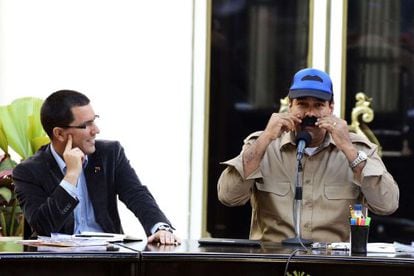Government and opposition make headway in new talks in Venezuela
Both sides agree to empanel a broader truth commission and look into the situation of some inmates

In the second round of talks aimed at suppressing the violence that has gripped the country over the past two months, the Venezuelan government and the opposition late Tuesday agreed on three issues following a five-hour closed-door meeting in Caracas.
Both sides said they will work together to investigate scores of violent acts that have erupted from the ongoing anti-government protests. At the same time, representatives of the opposition’s umbrella organization, the United Democratic Panel (MUD), said that its leaders, who govern in municipalities and states, will join forces with the Maduro administration’s anti-crime strategies.
Officials representing President Nicolás Maduro at the talks said they will also look into the situations of various high-profile prisoners, including former police commissioner Iván Simonovis, who has become the opposition’s most symbolic political prisoner and is reportedly in poor health.
Simonovis was sentenced to 30 years after he was convicted following a lengthy trial on charges related to the deaths that occurred during the failed 2002 coup plot against the late President Hugo Chávez. The opposition has long accused the government of putting on a show trial and wrongfully convicting an innocent man.
Nevertheless, both sides agreed to appoint a medical team to examine Simonovis, who suffers from a number of ailments.
The government rejected the opposition’s demands for blanket amnesty
The government, however, rejected the opposition’s demands for a blanket amnesty for all persons who have been jailed since the protests began on February 12, including the leader of the People’s Will (VP) faction, Leopoldo López.
Weeks ago, Maduro proposed creating a truth commission with nine deputies – five from the ruling United Venezuela Socialist Party (PSUV) and four from the opposition – but MUD initially rejected that offer because of the repression they said that was being committed by military officials and law enforcement authorities against protestors.
But Ramón Guillermo Aveledo, MUD secretary general, said that the opposition will work with the government to ensure that the commission is made up of high-profile and respected citizens who will investigate allegations of torture by authorities and violent acts by demonstrators.
Vice President Jorge Arreaza expressed his satisfaction that opposition governors and mayors will sign-up to the government’s national anti-crime plan. With some 24,000 homicides committed last year, Venezuela has one of the highest murder rates in the world. The opposition had refused to cooperate with the government because it feared that the strategy was aimed only at cracking down on dissent and not focused on arresting criminals.
Despite the headway made at Tuesday’s meeting, the agreements are insufficient for the opposition VP party, which has refused to take part in the discussions. VP leaders who called the February 12 nationwide demonstration are still demanding that Maduro step down – a demand that, for now, is not likely to be tackled at the bargaining table.










































